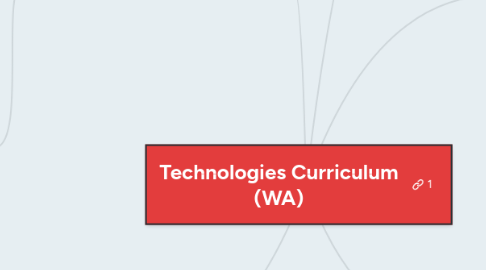
1. Subjects/Strands (Scope & sequence link)
1.1. Digital Technologies (Computational Thinking)
1.1.1. Knowledge and Understanding
1.1.1.1. Digital Systems: Components of digital systems
1.1.1.2. Representation of Data: representation and structure of data
1.1.2. Processes and Production Skills
1.1.2.1. Collecting, managing and analysing data
1.1.2.2. Digital Implementation
1.1.2.3. Creating Solutions by
1.1.2.3.1. Investigating and defining
1.1.2.3.2. Designing
1.1.2.3.3. Producing and implementing
1.1.2.3.4. Evaluating
1.1.2.3.5. Collaborating and managing
1.2. Design and Technology (Design Thinking)
1.2.1. Knowledge and Understanding
1.2.1.1. Technologies contexts
1.2.1.1.1. Engineering principles and systems
1.2.1.1.2. Food and fibre production
1.2.1.1.3. Food specialisations
1.2.1.1.4. Materials and technologies specialisations
1.2.1.2. Technologies and society: use, development and impact on every day lives
1.2.2. Processes and Production Skills
1.2.2.1. Creating Solutions by
1.2.2.1.1. Investigating and defining
1.2.2.1.2. Designing
1.2.2.1.3. Producing and implementing
1.2.2.1.4. Evaluating
1.2.2.1.5. Collaborating and managing
2. Other aspects
2.1. Student Diversity
2.1.1. Students with a disability
2.1.2. Gifted and Talented students
2.1.3. English as an additional language or dialect
2.2. Ways of Teaching
2.3. Ways of Assessing
3. Curriculum Aims and Objectives
3.1. Critical thinking
3.2. Technology development
3.3. Impacts and use of technology in the economy, environment and society
3.4. Use and select appropriate technology
4. Key Ideas/Concepts: Overarching ideas
4.1. Project Management: Skills required to manage and complete projects.
4.2. Thinking in technologies - Systems, Design and Computational thinking
4.3. ICT: helps students to become confident developers of digital solutions.
4.4. Safety: Identifying and managing risk in technologies. Includes food, health, safety and injury. Ethical and legal considerations.
5. General Capabilities:
5.1. Literacy
5.1.1. Contextualised language promoting flexibiity
5.1.2. Varied representation of technologies information
5.1.3. Communication of technologies processes: articulating, questioning and evaluating ideas.
5.2. Numeracy
5.2.1. Relate to every day life. Generate ideas, test concepts, refine. Managing and making projects: cost and sequencing skills
5.2.2. Number & Algebra, Number & Geometry.
5.2.3. Computational thinking
5.3. ICT
5.3.1. Digital Technologies
5.3.1.1. Economic, environmental & social factors considered
5.3.1.2. Understand and apply characteristics. Formulate, represent & generate digital solutions
5.3.2. Design and Technology
5.3.2.1. Enhancement of ICT concepts/skills
5.3.2.2. Software app/digital hardware; awareness of design ideas
5.3.2.3. Develop design ideas
5.4. Critical and Creative Thinking
5.4.1. Preferred futures
5.4.2. Analyse for improvements on our lives
5.4.3. Abstract problems, evaluation, solutions
5.5. Personal and Sociable Capability
5.5.1. social awareness, diversity,
5.5.2. Collaboration, leadership, risk taking, resilience
5.6. Ethical Understanding
5.6.1. Ethical procedures/privacy
5.6.2. Rights, responsibilities & sustainability
5.7. Intercultural Understanding
5.7.1. Diversity, tradition, cultural awareness
